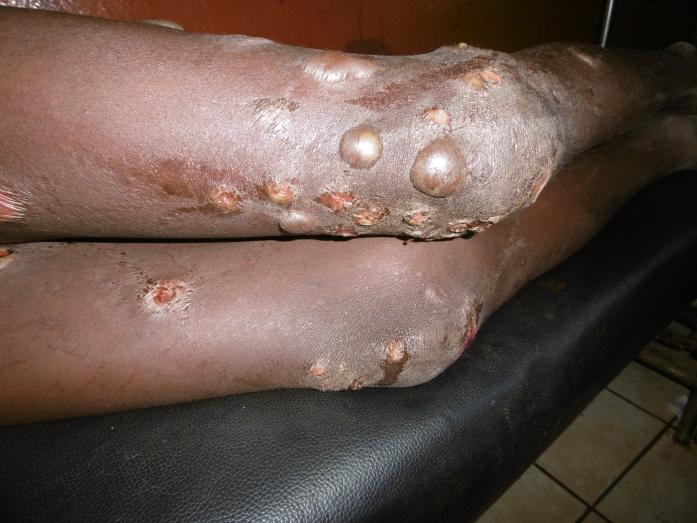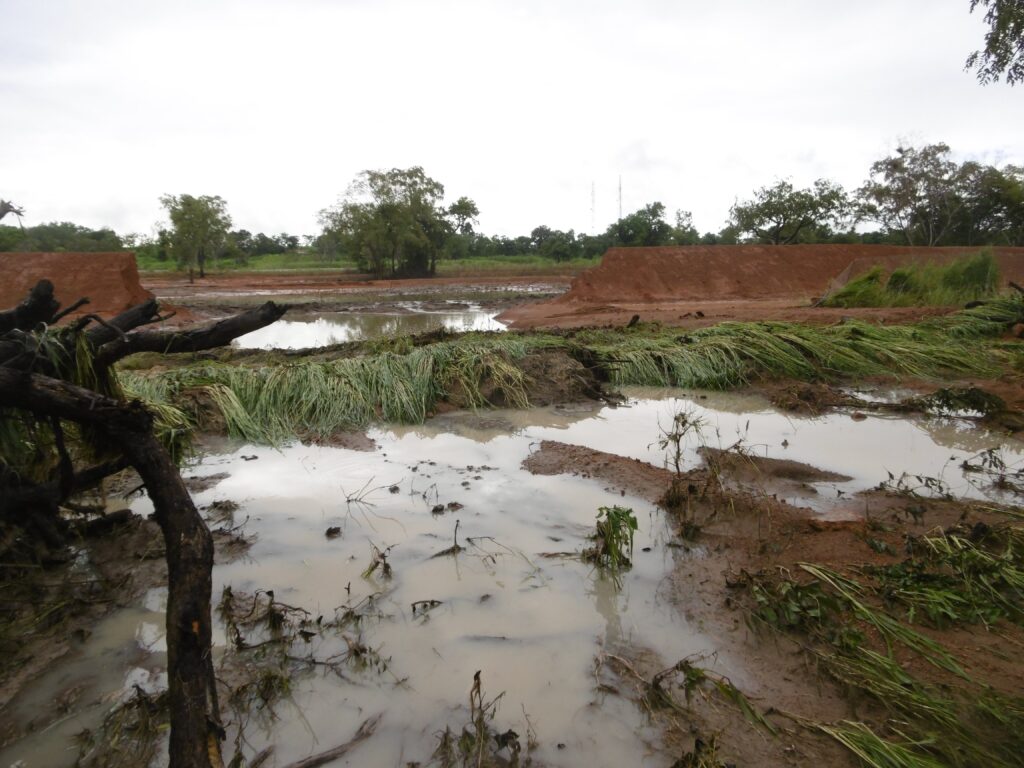Two years after spill, still no remedy for environmental/human rights harms at Badila oilfield
Francais ici
Three human rights groups today filed a complaint with the Organization for Economic Co-operation and Development (OECD) detailing environmental and human rights harms at Glencore’s Badila oil operations in Chad. Glencore is one of the world’s largest natural resource companies and is listed on the London Stock Exchange. The filing marks the first time that Glencore is facing an OECD complaint in the UK.
The OECD filing comes on the two-year anniversary of a toxic wastewater spill on 10 September 2018 when a basin that was holding produced water, a by-product of crude oil production, collapsed at the Badila oilfield in southern Chad. Eighty-five million litres of wastewater (the equivalent of 34 Olympic-sized swimming pools) flooded agricultural fields before pouring into the local Nya Pende River. According to residents, the basin had been leaking weeks before it collapsed, but Glencore failed to properly address the problem or to warn local residents about the impending danger. A few weeks later, local residents also reported an oil pipe leak.
The incidents left at least 50 local residents living near Glencore’s oil operations with burns, skin lesions, sickness and diarrhoea after bathing in or using the contaminated river water. Many of those harmed were children, some of who required hospitalisation. Livestock drinking from the river also died. Local residents say Glencore has still not acknowledged the harm caused or provided remedy.

Above: Injuries to a 13-year old boy who washed in the river downstream of the wastewater basin spill and the oil pipe leak on or around 26 September 2018
The complaint to the OECD, on behalf of approximately 18,000 local residents affected by the Badila’s operations, was filed by UK-based corporate watchdog RAID and Chadian organisations the Public Interest Law Center (PILC) and the Association of Young Chadians of the Petroleum Zone (Association des Jeunes Tchadiens de la Zone Petroliere – AJTZP).
“No community, whether in Africa or elsewhere, should have to wait two years for a company to properly investigate whether its toxic spill caused health effects to children and others,” said Anneke Van Woudenberg, the Executive Director of RAID, whose organisation published a detailed report about the harm in March 2020. “We believe Glencore UK has violated the OECD Guidelines and we hope the UK government will offer its good offices to consider the matter and rectify the wrongs.”
Glencore’s oil business, including the Badila oilfield operated by PetroChad Mangara Ltd, is managed by Glencore UK Ltd out of its London headquarters. The complaint is directed to the UK National Contact Point (NCP) which oversees the implementation of the OECD Guidelines for Multinational Enterprises across issues such as human rights and the environment for UK-based companies operating domestically or overseas.
More recently, on 21 July 2020, a second spill occurred at the Badila oilfield from a waste oil sump, further contaminating the local environment and the river. In Melom village, near to the oilfield, residents reported a hydrocarbon sheen on drinking water from the local well. In the immediate aftermath, as Glencore worked to clean up the spill, it advised residents not to drink the water. Test results of the well and river water have yet to be made available to local communities and civil society, but Glencore told RAID in late August of this year that subsequent analysis showed “no indication of contamination relating to the release from the Badila facility, including at the Melom water well.”
AJTZP’s Aristote Benainou drew media attention to the spill and demanded that Glencore’s water testing results be disclosed. Shortly after, the human rights defender was harassed by local authorities, who issued a summons for his arrest and closed the AJTZP offices, effectively muzzling the main civil society group monitoring the effect of Glencore’s oil operations on local residents.
RAID reported the harassment to Glencore UK. The OECD Guidelines direct companies to use their leverage when human rights, including freedom of speech, are violated.
“Glencore should publicly denounce any unjustified attacks against its critics,” said Delphine Kemneloum Djiraïbé, the chief attorney of PILC. “Attacks and threats against human rights defenders are a global issue of growing concern and responsible mining companies should reject harassment, threats and attacks against those who work to promote and protect human rights.”
In the two-year period since the September 2018 spill, the human rights groups have communicated their concerns and the adverse impacts on local residents to Glencore UK and PetroChad Mangara, and met their representatives at the company’s office in London. But lack of concrete action and remedy by Glencore UK to date has led them to file the OECD complaint.
The 49-page complaint to the UK NCP sets out in detail the alleged breaches of the OECD Guidelines by Glencore UK, including flawed environmental due diligence, violation of human rights provisions including access to clean water, the right to health and the right to an adequate standard of living, as well as a lack of meaningful engagement with local residents and inadequate social investment in one of the poorest places in the world. Chad ranks 187 out of 189 countries on the UN’s Human Development Index.
Glencore refutes that the wastewater spills posed a health risk to local communities. It said that the September 2018 wastewater from the basin was predominately rainwater and that it was found to be “within the limits required by the International Finance Corporation’s performance standards.” RAID pointed to results that exceeded these standards and noted that more than half of IFC’s criteria were not tested. Glencore said it would review its water testing protocols.
In correspondence with RAID in March 2020 Glencore said: “We continue to believe that the identified medical cases are unrelated to our operations, however, we are committed to trying to understand the root causes.” Glencore said it would commission an “independent Health Impact Risk Assessment” at the Badila oilfield, but this has yet to be concluded.
—–
Notes to Editor:
The OECD Guidelines for Multinational Enterprises are the only government-backed international instrument on responsible business conduct with a built-in grievance mechanism. Although the OECD Guidelines are not legally binding on companies, they are binding on signatory governments, such as the UK, which is required to ensure the Guidelines are implemented and observed. The NCP receives complaints against companies that have allegedly failed to adhere to the Guidelines’ standards.
Complaints, or Specific Instances (the term officially used in the Guidelines), are usually handled through mediation or other conciliatory practices that seek to help parties reach mutual agreement on past acts and future goals. If mediation fails, NCPs can make a public determination and set out recommendations to companies.
The OECD complaint against Glencore UK is the first concerning Glencore in the UK, as well as the first against the Glencore group after the Guidelines were extensively revised in 2011 to include a dedicated human rights chapter and a new approach to due diligence. Glencore faced a previous OECD complaint in 2011 in Switzerland when five human rights and civil society groups filed a complaint against Glencore Plc for financial and accounting manipulations linked to its mining operations in Zambia. The complaint was accepted by the Swiss NCP and closed in 2012 after mediated dialogue.
Glencore has also been criticised by civil society groups for its reporting on human rights. In June 2020, 12 human rights and environmental groups raised serious concerns about the company’s Sustainability Report, saying it lacked credibility. Civil society groups said that Glencore omitted crucial human rights and environmental incidents that occurred at a number of its sites, downplayed others and used a narrow definition to limit reporting on human rights incidents. Glencore’s claimed that it had “zero” serious human rights incidents amid local communities worldwide.
In response to the criticism, Glencore said it was “planning to review [its] classification of human rights incidents”, a promise made previously.
Click here for RAID’s March 2020 report:
Additional Links:
For a copy of the OECD complaint, click here.
RAID’s March 2020 report Glencore’s Oil Operations in Chad: Local Residents Injured and Ignored
Correspondence between RAID and Glencore click here.
Press release: Rights Groups Say Glencore’s Sustainability Report Lacks Credibility
Blog: Glencore growing legal troubles with Katanga Mining
Report : PR or Progress? Glencore Corporate Responsibility in the DRC (June 2014)


